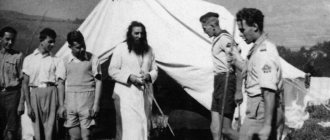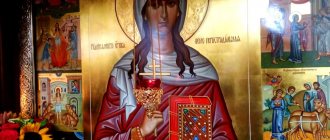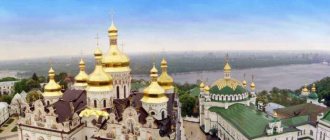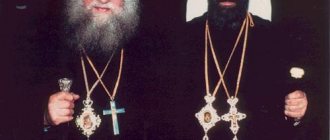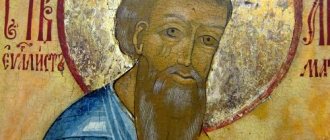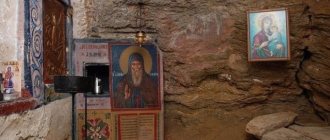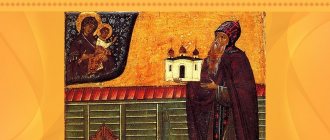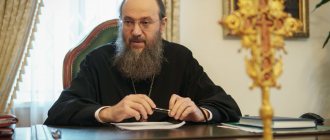In the world, Khrapovitsky Alexey Pavlovich, was born on March 17, 1863 in the family of an old Novgorod nobleman-landowner, public figure, former general and hero of the war of 1877-1878.
Raised by his mother in a church-ascetic spirit, after graduating from high school with a gold medal, he entered the St. Petersburg Theological Academy.
In his early youth he was greatly influenced by Dostoevsky, often visited him, talked with him a lot, establishing himself in Christianity, Orthodoxy and monasticism. Khrapovitsky's friends suggested that it was not from him that Dostoevsky wrote Alyosha Karamazov, especially since the name was the same.
At the end of the 4th year at the Academy, Alexey accepted monasticism with the name Anthony and in 1885 was ordained hieromonk. He led a modest and strict life, fulfilling the vows of monasticism.
Academic career
In 1885, upon graduating from the Academy, Anthony was retained there as a professorial fellow and at the same time, serving as assistant inspector of the Academy from 1885 to 1886.
In 1886 he was appointed teacher of Homiletics, Liturgy and Canons at the Kholm Theological Seminary.
In 1887, he was elected acting assistant professor at the St. Petersburg Theological Academy in the department of Holy Scripture of the Old Testament. In "Church" Vestnik" for 1891 is mentioned as a teacher in the department of "Introduction to the Circle of Theological Sciences" of the same Academy until 1890.
In 1888 he received a master's degree in theology after defending a dissertation on the topic: “Psychological evidence in favor of free will and moral responsibility.” In the same year, he was appointed to the rank of Associate Professor at the Academy.
In 1889 he was appointed acting inspector of the St. Petersburg Theological Academy.
In 1890, he was appointed to the post of rector of the St. Petersburg Theological Seminary, with elevation to the rank of archimandrite, and a few months later he was transferred to the post of rector of the Moscow Theological Academy.
Under him, on November 8, 1891, the academic journal “Theological Bulletin” was founded.
According to the memoirs of Rev. Sergius Chetverikov, who was studying at the Moscow Academy of Sciences at that time, “Vladyka Anthony was the heart of our academic world... The doors of his chambers were always open to students. He himself often came to our evening prayers at the academic church and talked about something after prayer. He knew how to approach each of us, and the spirit of formalism and officiality was eliminated from our relations with him. We lived warmed by his love and affection. And at the same time, these relationships were alien to any familiarity. We felt his immeasurable superiority... He for the first time, perhaps, revealed to many of us the meaning of Orthodox shepherding as a loving and selfless acceptance of his flock into his soul, experiencing with her all the sorrows and joys, all the trials, temptations and falls of his spiritual children and rebirth and rebellion through the power of compassionate love and prayer.”
In 1895 he was appointed rector of the Kazan Theological Academy. This transfer occurred due to disagreements with Metropolitan Sergius (Lyapidevsky) of Moscow, who insisted that one should not become a monk before the age of 30.
Vicar of the Kazan diocese
On September 7, 1897, he was consecrated Bishop of Cheboksary, Vicar of the Kazan Diocese. The consecration was performed in Kazan by: Archbishop of Riga and Mitau Arseny (Bryantsev), as a representative of the Holy Synod, Bishop of Nizhny Novgorod and Arzamas Vladimir (Nikolsky), Bishop of Samara Gury (Burtasovsky), Bishop of Sarapul Nikodim (Bokov) and Bishop of Balakhna Arkady (Karpinsky).
On March 1, 1899, he was appointed Bishop of Chistopol, first vicar of the Kazan diocese, retaining the position of rector.
The Reverend Anthony enjoyed the deep love of the youth and those around him, and his modesty and simplicity kept increasing the crowd of his followers. His enchanting charm “captivated the heart of every person into obedience to him from the first acquaintance, from the first meeting.” Those who did not know him closely were amazed at the irresistible power of his moral influence on the hearts and will of the students, and said that he had the power of “suggestion.”
He influenced people not with severity and legality, but with a kind, gentle word. Rev. Anthony has long gained wide popularity as a very zealous and zealous disseminator of spiritual enlightenment and theological science among the masses. At the St. Petersburg Academy, he was the soul of a circle of student preachers who carried the fruits of academic science to churches in extra-liturgical readings, public and private halls, factories, prisons, and shelters; He founded the same circles at the Moscow and Kazan academies.
An opponent of all administrative and educational strictures and restrictions, Rev. Anthony always strived to achieve student compliance with rules, regulations and programs of free will. Providence was pleased to take him to almost all academies, and everywhere he left a noticeable mark behind him. As a leader, teacher, scientist and educator, Bishop Anthony was an idol of student youth. Reverent at the height of monastic service, Bishop Anthony captivated academic youth with his mood and was one of the ideological founders of monasticism and the nurturer of a numerous new school of learned monasticism. Anthony (Vadkovsky) is considered the founder of learned monasticism. Bishop Anthony was the first to justify the lifestyle of academic-administrative monasticism, which broke ties with the monastic retreat. The monastic intelligentsia grouped around Bishop Anthony, and under his influence many accepted monasticism.
During the period of his rectorship at theological academies, Bishop Anthony tonsured more than 60 students, most of whom subsequently became bishops. Already in his later years, in his teachings, he spoke a lot and convincingly about the difficult life consequences that befall those who, intending to enter the path of monasticism, as if having heard the call of God, for some worldly reasons deviated from this path.
Alexey Khrapovitsky, at the behest of his father, graduated from high school, but after that he went to the theological academy
Alexey Pavlovich Khrapovitsky was born on March 19 (22), 1863 in the village of Vatagino.
He had a noble origin - from the nobility. The father was a general, the family lived prosperously and moved to St. Petersburg.
March 19, 1863
on this day Alexey Pavlovich Khrapovitsky was born in the village of Vatagino
His mother was the first person to push young Alexei on the path of serving God. With her approval, her son began to take part in bishop's services. However, his parents did not consider this a sufficient reason to send him to a theological school.
When the boy turned five, he was sent to a gymnasium.
Anthony Khrapovitsky
But Alexei’s interest in the spiritual sphere did not fade away. The experience of Christian worship and the knowledge that the son received from his mother reminded him of himself, and a fifth-grader at the St. Petersburg gymnasium wrote a service to Cyril and Methodius.
Years later they actually began to carry it out. Alexey Khrapovitsky had prospects, but a worldly career did not interest him.
Having become a gold medalist, Alexey repaid his debt to his father, but no longer allowed him to decide for himself.
In 1881 he entered the Theological Academy. It was a difficult step. After all, he was not limited to just opposing his parents’ will.
Alexey Khrapovitsky is a hereditary nobleman and a graduate of the gymnasium. We didn’t meet such people at the Theological Academy.
Bishop of Ufa and Menzelinsky
On July 14, 1900, he was transferred to the independent Ufa and Menzelin department.
At the suggestion of i.d. rector, inspector of the Kazan Academy on August 17, 1900, Rev. Anthony, Bishop of Ufa and Menzelinsky, was decided: to be elected as an honorary member of the Kazan Theological Academy in view of his eminence and fruitful activity, in view of his solid literary and scientific-theological works, in view of his outstanding church-oratorical talent and tireless preaching of the word of God and, finally, in view of his generous charity and financial assistance to needy students of the Academy.
At the Volyn department
On April 27, 1902, he was appointed Bishop of Volyn and Zhitomir, Holy Archimandrite of the Pochaev Dormition Lavra.
In 1906 he was elevated to the rank of archbishop.
In 1908, while ruling the Volyn diocese, he was the first of the Russian hierarchs to respond to judgments on the issue of restoring the patriarchate in Russia, publishing a brochure with the corresponding content as a supplement to the magazine “Russian Monk”. From a young age, Anthony was a great supporter of the patriarchate. On Illovaisky’s Russian history textbook, he wrote notes praising Patriarch Nikon and condemning Tsar Alexei.
In 1911 he was awarded a diamond cross to be worn on his hood.
In 1912 he was appointed a member of the Holy Synod, leaving him at his current chair.
At the Kharkov department
On May 14, 1914, he was appointed Archbishop of Kharkov and Akhtyrka.
On May 1, 1917, he was retired, according to the petition, with the appointment of his place of residence in the Valaam Monastery of the Transfiguration of the Savior of the Finnish Diocese.
On August 16, 1917, he was again appointed Archbishop of Kharkov and Akhtyrka.
In the fall of 1917, at the All-Russian Local Council there was one of three candidates for patriarch, along with Bishops St. Tikhon of Moscow and Arseny of Novgorod. At that time, popular rumor rated him as the “smartest” of the bishops of the Russian Church - in contrast to the “most strict” Arseny and the “kindest” Tikhon. A brilliantly educated and talented church writer, a prominent church figure in the last two decades of the synodal era, a longtime champion of the patriarchate, Vladyka Anthony enjoyed the broadest support of the council of the three candidates as a fearless and experienced church leader. During the voting, he received the largest number of votes, but the Lord took this lot away from him.
On November 28, 1917, he was elevated to the rank of metropolitan.
Metropolitan Anthony remained in the history of Orthodoxy as an outstanding shepherd, but not a theologian
Although Metropolitan Anthony’s views are quite contradictory and have become the basis for criticism, church leaders speak very warmly about this. They note that for him it was the Orthodox Church that was of paramount importance, and not the monarchy or anything else.
Anthony supported any of his views by what he believed to be correct from the point of view of Orthodoxy, and even if he was wrong, he still deserved respect for his devotion to his ideals. He headed the Church without a state, being already in old age, but he boldly bore this cross.
And his pastoral activities and oratorical talent deserve special consideration. Hieromonk Eutychius (Dovganyuk) wrote on this topic:
“The rector of three academies, one of the most famous Russian bishops, who received the largest number of votes in the election of the patriarch, Metropolitan Anthony was by vocation more a shepherd than a theologian.
But despite this, and largely thanks to this (that is, his pastoral talent), he had a significant influence on young theologians, including on their choice of topics for scientific development.”
During his life, Anthony Khrapovitsky left a lot of works: lectures, services, conversations, etc.
You can purchase the Metropolitan’s books in the Sretenie online store
Complete works of Anthony Khrapovitsky
By leaving a comment, you accept the user agreement
Proceedings
In 1900, the complete collection of works of Metropolitan was published in Kazan. Anthony in three volumes. These three volumes allow us to form a fairly complete picture of him as a writer. His philosophical dissertation, modest in scope, is buried in them as an inconspicuous and uncharacteristic particle. The fact of free will is proven here from its “givenness” in our consciousness and self-awareness.
The next scientific work of Metropolitan. Anthony, which grew out of his professorial studies, is “Commentary on the Book of St. the Prophet Micah" (St. Petersburg, 1891), it was also included in the collection of his works. Having paid tribute to science, Anthony in the rest of his works appears in the typical guise of a publicist. His language is distinguished by liveliness and lightness, not alien to sharp abandon in places. A responsive temperament, a good literary education, an agile mind and insight when meeting people gave him great power over the spiritual students. The young men sat for a long time with their incredibly hospitable and affectionate rector. “This is a university,” one of them exclaims; “This is an ancient Greek academy: here, among chatter and jokes, ideas are sown, each of which is worthy of growing into a dissertation.” Often, as it happened, but much more young monks of a special color emerged from there.
Anthony's theological views are not devoid of individuality and even innovation, causing him at some points to even engage in direct polemics with fixed orthodoxies.
He emphasized the social mission of the Church, and in relation to this task, he developed a whole system of pastoral counseling, close to the interests of life and to the intellectual level of society.
The metropolitan's directness, bordering on harshness, made a negative impression on many, especially dissenters. One of his brother’s comrades in his youth asked him: “Do you, an intelligent, educated man, believe that Christ ascended to heaven, and that prosphora and wine turn into His Flesh and Blood?” “I cannot doubt,” answered Anthony, “if I doubted, then I would have no choice but to throw myself off the Liteiny Bridge headfirst.”
Everyone knew his wit of a somewhat rude nature. They said that he, it seems, while still a student, at a gala dinner, to a humorous question from a relative of the Khrapovitskys, Major General Krepke, why “metropolitan” and not “metro-shoot”, he answered: “And why, Your Excellency, “du- cancer”... Here he paused for a long time and calmly, looking into the eyes of the stunned general, finished in a lowered voice..., and not “du-fish”...
When the chief prosecutor proposed to the Synod to elevate the illiterate monk Barnabas to the rank of bishop, one of the members of the Synod began to object. Then it was made clear that this was what the Empress and Rasputin wanted. Metropolitan Anthony said (obviously sarcastically): “Well, well! We are ready to make a black hog a bishop, since they want it.”
For his learned theological works, which were originally published in Kazan and then republished by the book publisher I.L. Tuzov, Metropolitan Anthony received the title of Doctor of Theology.
He published his works mainly in academic publications: “Church. Vestn." (St. Petersburg Academician), “Theology. Vestn." (Moscow Academician), “Right. Social security.” (Kazan. Acad.), “Ufim. Eparch. Ved.,” “Church. Ved.", "Ms. Review", "Volog. Eparch. Ved.,” “Volyn. Eparch. Ved.,” Newspaper “Bell” (V. Skvortsov), etc.
In the above journals, Archimandrite. Anthony published many sermons and articles that were not included in our list of his works.
List of essays
“Psychological Evidence for Free Will and Moral Responsibility (Master's Thesis). St. Petersburg, 1887. Ed. 2nd St. Petersburg, 1888. “Conversations about the Orthodox understanding of life and its superiority over the teachings of L. Tolstoy.” St. Petersburg, 1889. “The superiority of Orthodoxy over the teachings of papism as presented by V. Solovyov.” St. Petersburg, 1890. Conversations about the superiority of the Orthodox understanding of the Gospel in comparison with the teachings of L. Tolstoy.” Ed. 2nd. St. Petersburg, 1891. “Interpretation of the Old Testament.” Issue 7. "Interpretation of the book of St. Prophet Micah." St. Petersburg, 1891. “Pastoral study of people and life according to the writings of F.M. Dostoevsky" (from "God. Vestn." 1893). [Source: BEL vol. III, stb. 778-780]. "From readings on Pastoral Theology." Kazan, 1896. “Critical review of the bibliographic message “Above the Gospel.” “Right. Social security.” 1897, February, p. 1. “Is moral life possible without the Christian religion?” (Regarding the “Critique of Dogmatic Theology” by L.N. Tolstoy). “Right. Social security.” 1897, April, p. 491-524. “The meaning of prayer for the shepherd of the Church.” “Right. Social security.” 1897, May, p. 587-607. “About love for neighbors” (Homily on Holy Thursday). “Right. Social security.” 1897, June, p. 727-731. “Word before the thanksgiving service at the end of the 3rd All-Russian Missionary Congress.” “Right. Social security.” 1897, September, p. 239-243. “What is the significance of faith in Jesus Christ as God for moral life.” Kazan, 1886. “Right. Social security.” 1896, September, p. 3-21. Moral teaching in Tolstoy’s work “The Kingdom of God is within you” before the court of Christian teaching. Ed. 2nd. M., 1897. Ed. 3rd. M., 1902. Word at the burial of the Most Reverend. Bishop Michael of Tauride on August 22, 1898. “Right. Social security.” 1899, January, p. 68. “The moral idea of the dogma of the Holy Trinity.” Ed. 2nd, Kazan, 1898. A word before the memorial service about Pushkin. (Said at Kazan University on May 26, 1899). “Right. Social security.” 1899, June, p. 783-801. "On the spiritual gifts of youth." “Right. Social security.” 1899, October, p. 408-419. Lectures on Pastoral Theology. Kazan, 1900. Works in three volumes: Volume 1 - Sermons, Volume II - Articles of dogmatic content, Volume III - Articles of philosophical and critical content. The word at the memorial service for Grand Duchess Alexandra Petrovna, nun Anastasia, spoken in the Kazan Cathedral on April 17, 1900. “Right. Social security.” 1900, May, p. 481-485. In memory of K.P. Pobedonostseva. “Voice of the Church” 1912, March, p. 170-171. Russian truth. “Voice of the Church” 1912, October, p. 167-174. “Conversation between a Christian and a Mohammedan about the truth of the Holy Trinity.” 1903 “Son of Man.” “Theologian.” Bulletin", No. 11, 1903, p. 361-370. "A Tale of the Last Judgment and Contemporary Events." 1905 "Statement on Freedom of Religion in the 6th Section of the Pre-Conciliar Presence of May 19, 1906." Pochaev, 1906. “Letter addressed to K.P. Pobedonostsev in early November 1905." 1906 “On closer relations with the army of pastors and archpastors of the church.” 1906 "The Moral Meaning of the Fundamental Christian Dogmas." Vyshny Volochek, 1906. “On Orthodox shepherding.” M., 1906. “From the district message.” "Arr. to "CV" 1907, No. 31, p. 1259. “Word at the thanksgiving service after the elections to the Third State Duma.” 1907 “The Word about the Chisinau Events.” Chisinau, 1908. “On the restoration of the patriarchate in Russia.” Pochaev, 1908. “A good reminder to a Russian recruit from an Orthodox archpastor.” M., 1909. Collection of lectures and articles on Pastoral Theology. M., 1909. Article: “Temple of Glory and Temple of Sorrow.” "Arr. to "CV" 1909, No. 41, p. 1909. Article: “Pastoral Conversation.” "Arr. to "CV" 1910, No. 6, p. 228. Speech at the presentation of the staff to the newly ordained bishop. Gabriel of Ostrog in the Zhitomir Transfiguration Cathedral. "Arr. to "CV" 1910, No. 32, p. 1325. Sermon on the transfer of St. relics of St. Euphrosyne of Polotsk May 21, 1910. “Russian. Pilgrim." 1912, No. 42, p. 656. Word delivered in the seminary church on September 9, 1910 at the 150th anniversary of the Kholm Theological Seminary. "Arr. to "CV" 1910, No. 46, p. 1943. District message to the Volyn flock about fasting. "Arr. to "CV" 1911, No. 11, p. 463. Speech at the meeting of the sovereign in the Ovruchensky temple. "Arr. to "CV" 1911, No. 37, p. 1527-1528. Word for the day of memory of St. Sergius. "God. Vestn." 1892, November, p. 247. Word at the prayer service before the start of the teaching on September 12, 1893 “God. Vestn." 1893, October, p. 111. Word at the presentation of the bishop's staff to the newly installed Bishop Pachomius. "Arr. to "CV" 1911, No. 40, p. 1655. "Trouble from false brethren." M. 1912 and “Voice of the Church” 1912, October, p. 132-149. Message to all Old Believers separating from the Orthodox Church. "Arr. to "CV" 1912, No. 10, p. 395, “Voice of the Church.” 1912, March, p. 30-47, Dept. ed. St. Petersburg, 1913. A word about Divine providence, revealed in the events during the accession of the House of Romanov. "Arr. to "CV" 1912, No. 19, p. 771, “Voice of the Church” 1912, May, p. 18-26. A word of truth to the concealers of the truth. "Arr. to "CV" 1912, No. 28, p. 1143, “Voice of the Church.” 1912, September, p. 27-43. “How does the Orthodox faith differ from Western confessions.” (“From Miss. Review.”) 1901, July-August, p. 3. “How does serving the public good relate to concern for the salvation of one’s own soul?” “Russian. Pilgrim." 1912, No. 42, p. 656. Treatise: “The Church of Christ, as the guardian and interpreter of Divine Revelation.” “Russian. Pilgrim." 1912, No. 42, p. 656. Word at the memorial service for the removal of the body of the late Bishop Met. Anthony in the Lavra Cathedral. M., 1912. "Arr. to CV" 1912, No. 45, p. 1821. Lamentation on the death of Patriarch Joachim III. M. 1912. "Arr. to "CV" 1912, No. 46, p. 1860, “Goal. Church." 1912, December, p. 135-140. "The moral idea of the dogma of the Church." Full composition of writings. vol. II, St. Petersburg, 1911. “Right. Social security.” 1913, January, p. 31. “On the new false teaching about the idolizer of names and on the “Apology” of Anthony Bulatovich.” "Arr. to "CV" 1913, No. 20, p. 869, “Russian. Monk" 1913, issue. 9, p. 554-556. “What does a bishop need to be most concerned about?” The word spoken when presenting the staff to the newly installed bishop. Dionysius April 20, 1913 “Approx. to “CV” 1913 “Approx. to "CV" 1913, No. 21, p. 939. Word at the burial of the Most Reverend. Arsenia, archp. Kharkovsky and Akhtyrsky on May 1, 1914. "Arr. to "CV" 1914, No. 28, p. 1229. First word to the Kharkov flock. "Arr. to "CV" 1914, No. 28, p. 1229. Speech by the Archbishop of Kharkov. "Arr. to "CV" 1914, No. 32, p. 1403. “Moral justification for the most important Christian dogma.” “Right. Social security.” 1915, November, December, p. 389. Word before the funeral service for the body of the deceased Metropolitan Flavian. "Arr. to "CV" 1915, No. 47, p. 2355. “Guidelines of Rev. Anthony, bishop Ufa, priests and other clergy in foreign and other parishes of the Ufa diocese.” "Arr. to "CV" 1901, No. 48, p. 1747-1751. District message to all Old Believers separating from the Orthodox Church. St. Petersburg, 1913. Letters to pastors. Speech at the presentation of the staff to Bishop Mitrofan of Sumy 5.IV.1916. "Arr. to "CV" 1916, No. 25, p. 607-608. "Orthodoxy". Dogma of the Atonement. Karlovtsy, 1926 “Two ways of shepherding - Latin and Orthodox.” (From Theological Vestn.). 1894. “On the Pastoral Vocation.” (From a manual for rural pastors). 1900[?]. “A new miracle from the Pochaev Icon of the Mother of God.” "Rus. Monk" 1911, July, issue. 12, p. 50. “Who should monasteries educate?” "Rus. Monk" 1911, December, issue. 48, p. 11-13. Project about deaconesses. "Rus. Monk" 1911, December, issue. 48, p. 58. Speech given to Kamenets-Podolsk pilgrims who came to the Pochaev Lavra on May 18, 1911. "Rus. Monk" 1911, May, issue. 10, p. 56. “On the reduction of inner life.” Word at the tonsure of Deacon Pavel Sosnovsky (Dionysius), a student at the Moscow Theological Academy. "Rus. Monk" 1913, No. 2, p. 101-104. “Monasticism is a feat of hope.” A word at the monastic tonsure of a student at the Moscow Theological Academy, Danilov (Stefan). "Rus. Monk" 1913, No. 3, p. 165-168. “How and with what to find peace of mind?” Word at the tonsure of volunteers of the Moscow Theological Academy Alekseev and Mashkin. Named: Micah and Serapion. "Rus. Monk" 1913, No. 4, p. 235. “Differences in the paths of monastic life.” Word at the tonsure of Moscow Theological Academy student Nikolai (Bessonov) Nikon. "Rus. Monk" 1913, No. 5, p. 291-294. "Abusive techniques of the enemy of the tempter." Word at the tonsure of Moscow Theological Academy student Vladimir Nikolsky (Andronik). "Rus. Monk" 1913, No. 6, p. 357. Speech at the meeting of Patriarch Gregory IV of Antioch. "Rus. Monk" 1913, No. 6, p. 365. “On the sorrows of monastic life.” Word at the tonsure of master's student of the Moscow Theological Academy Vasily Meshcheryakov (Evdokim). "Rus. Monk" 1913, No. 7, p. 421-427. "Painful duality." The word spoken at the monastic tonsure of 4th year students of the Kazan Theological Academy: priest Nikodim Troitsky (Nafanael) and 2nd year student Valentin Lebedev (Barsanuphius). "Rus. Monk" 1913, No. 8, p. 494-498. “The voice of the calling of God in life’s trials.” Word at the tonsure of students of the Kazan Theological Academy, priests - Mikhail Pavlov (Makariy) and Pavel Raevsky (Feodosiya). "Rus. Monk" 1913, No. 10, p. 630-634. “What should Constantinople be?” "Rus. Monk" 1916, No. 1, p. 14-21. "The Experience of a Christian Orthodox Catechism." Metropolitan Eleutherius. “The catholicity of the Church is God’s and Caesar’s.” Paris. 1938. The public good from a Christian point of view and from a modern - positive point of view. “Theologian.” Vestn." 1892, June, p. 413. “Sign of the Times” (“Novices.” Tale by N. Leskov). “Theologian.” Vestn." 1892, February, p. 415. “Two extremes – papists and Tolstoyans.” “Theologian.” Vestn." 1895, February, p. 181, May, p. 179. “Biblical teaching about the Hypostatic Word of God.” “Theologian.” Vestn." 1904, November, p. 387. First response memo of the Holy Rule. Synod. “Theologian.” Vestn." 1905, December, p. 698. Homily on the Day of the Intercession of the Most Holy Theotokos. “Theologian.” Vestn." 1894, November, p. 213. Word over the tomb of the deceased V. Metropolitan Theognost of Kyiv and Galicia on January 27, 1903. Proceedings of K.D.A. 1903, March, p. 343. Homily on the day of St. Nicholas. "Izv. Kazan. ep." 1896, No. 24, p. 429-436. A word to the graduating students of the Missionary Courses, delivered on April 7, 1896. "Izv. Kazan. ep." 1896, No. 9, p. 248-251. Reflections on the saving power of Christ's passion. "Izv. Kazan. ep." 1907, No. 15, p. 436 p/line Lecture on the topic: “Was Christ a revolutionary.” "Izv. Kazan. ep." 1908, No. 1, p. 35-38. Nravstvennyja idei vaznejsich christianskich pravoslavnych dogmatov. New York 1963 (= N. Rklickij /Hg./, Zizneopisani... Bd. XI). FM Dostoevskij kak propovednik vozrozdenija (= Rklickij, Zizneopisanie... Bd. XII). Ucenie o pastyre, pastyrstve i ob ispovedi. New York 1966 (= N. Rklickij, Zizneopisanie... Bd. XIII). Nravstvennoe ucenie Pravoslavnoj Cerkvi. New York 1967 (= N. Rklickij, Zizneopisanie... Bd. XIV). Slova, besedy i reci (O zizni po vnutrennemu celoveku), New York 1968 (= N. Rklickij, Zizneopisanie... Bd. XV). I. Soglasovanie evangel'skich skazanij o voskresenii Christovom. II. Psychologiceskija dannyja v pol'zu svobody voli i nravstvennoj otvetstvennosti. New York 1969 (= N. Rklickij, Zizneopisanie... Bd. XVI). Novyj opyt ucenija o bogopoznanii i drugija stat'i. New York 1969 (= N. Rklickij, Zizneopisanie... Bd. XVII). Conversations between an Orthodox Christian and a Uniate. About the errors of the Latins and Uniates of the Greek Catholics. Sremski Karlovci. Ed.... 1922. 32 p. Experience of the Christian [Orthodox] Catechism. Dedicated to His Beatitude Gregory IV, Patriarch of Antioch and the All East. Sremski Karlovci. Ed.... 1924. [147 p.]. Pastoral theology. [This collection is a collection of articles and lectures by His Beatitude Metropolitan Anthony on religious issues from the field of science of pastoral theology, and is a republished part of the 2nd volume of his Complete Works]. Harbin. Ed. Abode of Mercy. 1935. 179 p. Pushkin as a moral person and an Orthodox Christian. Belgrade. Ed. "The Tsar's Messenger". 1929. 24 p. Collection of Selected Works. With a portrait and biography of the author. Anniversary edition for the 50th anniversary of the priesthood. Belgrade. Ed. [Printing house “Slovo”]. 1935. 11 + 431 pp. Church teaching about the Holy Spirit. Paris. YMCA-PRESS. (1926). 40 s. Biography. Letters to various persons, 1919-1936. SPb.: Publishing house. Oleg Abyshko, 2006. 288 p. Collected works. T. 1-2. M.: Dar, 2007. Selected works, letters, materials. M.: PSTGU, 2007. 1056 p.
Literature
- “Church. Ved." 1897, No. 34, p. 337, 1899, No. 11, p. 61, 1900, No. 30, p. 281, 1902, No. 18-19, p. 114, 1904, No. 46, p. 487, 1905, No. 22, p. 265, 1906, No. 18, p. 207, no. 25, p. 327, no. 34, p. 379, 1907, No. 2, p. 8, 1908, No. 38, p. 291, 1909, No. 24, p. 246, 1911, No. 19-20, p. 106, 1912, No. 19, p. 179, 1914, No. 21, p. 256, 1917, No. 28-19, p. 117, no. 35, p. 295.
- "Arr. to "CV" 1918, No. 5, p. 175.
- “Church. Ved." 1918, No. 21-22, p. 162-163.
- "Arr. to "CV" 1897, No. 38, p. 1340, 1900, No. 37, p. 1482-1487.
- “Right. Social security.” 1897, June, p. 232, 727-731, February, p. 177-189, October, p. 379-396, December, p. 9, 32, 1900, May, p. 481-485, September, p. 298, November, p. 7, 585, December, p. 701-705, 1901, January, p. 134, 1902, March, p. 81, 93, April, p. 139, 1905, July-August, p. 9, November, p. 545, 1907, March, p. 14, 1913, April, p. 189-190, December, p. 836, 1914, February, p. 3, March, p. 560, June, p. 1017, 1915, November, December, p. 392, 1899, January, p. 3, 9, 25.
- "Rus. Palom." 1911, No. 47, p. 750, 1912, No. 17, p. 255, No. 42, p. 656, 1914, No. 18, p. 287, no. 26, p. 417, 419-420.
- “Church. Vestn." 1891, No. 8, p. 113, 1894, No. 31, p. 991, No. 36, p. 1143, 1895, No. 36, p. 1143, 1908, No. 25, stb. 763, No. 27, stb. 841, No. 31, stb. 966.
- "Rus. Monk" 1911, issue. 10th, p. 59-61, no. 44th, p. 71-73, issue. 48th, p. 53-54, 1913, issue. 87th, p. 962.
- "ZhMP" 1931, No. 2, p. 5, 1946, No. 3, p. 28, no. 5, p. 40, 41, 1951, No. 6, p. 25, 1957, No. 12, p. 37, 1958, No. 12, p. 53.
- “Ms. Calendar" 1907, p. 128-129.
- "Rus. Antiquity" vol. CX, 1915, p. 632.
- "The truth about religion in Russia." M. 1942, p. 46.
- "Izv. Kazan. ep." 1892, No. 24, p. 707-708, 1897, No. 18, p. 484, 485, 491, No. 19, p. 531, 1898, No. 11, p. 478, 1899, No. 6, p. 239, no. 10, p. 439-440, 1900, p. 837-839, 1903, No. 16, p. 18, report, no. 20, p. 613, 1911, No. 27-28, p. 839, 840, 1912, No. 3, p. 89-90, No. 9, p. 300, no. 10, p. 344, No. 11, p. 374, no. 14, p. 454, 461, No. 15, p. 489, no. 16, p. 516, no. 36, p. 1078, no. 38, p. 1145, No. 41, p. 1242, No. 47, p. 1447, 1913, No. 1, p. 22, no. 4, p. 143, no. 19-20, p. 619-621, No. 21, p. 655, No. 23-34, p. 721-722, No. 36, p. 1092-1094, 1914, No. 19-20, p. 626.
- “Histor. Vestn." 1906, August, p. 592, 593, 598.
- "Rest. Christ." 1908, August-September, p. 59.
- “Samar. Ep. Ved." 1903, No. 15, p. 831.
- “Simbir. Ep. Ved." 1901, No. 17, p. 582.
- “Ms. Reviewed." 1902, December, p. 899.
- "Red Archive" 1928, vol. 26, p. 120.
- Bulgakov, p. 1389, 1401, 1416.
- Anniversary collection. M., 1914, p. 664, 665, 726.
- BEL vol. I, stb. 904-905, vol. III, stb. 778-780, vol. 7, stb. 727, 728.
- BES vol. I, stb. 197, 198, 547, vol. II, stb. 2215.
- NES vol. III, stb. 67, 68, 69 and additional. vol. I, p. 128.
- Vengerov. Brief biographer. words vol. I, p. 648-649.
- Iliodor. Notes about Grigory Rasputin. Petrograd, 1914, p. 6, 107, 128.
- Tuzov catalogue, p. 17.
- FPS I, No. 11, III, p. 1.
- “Composition of the Holy Rules. All R. Syn. and Ros. Church Hierarchies for 1917,” p. 40-41.
- "Memorable Book of Petrogr. Spirit. Academy for the 1915/1916 school year. year", p. 6.
- EB Nikon (Rklickij), Zizneopisanie Blazennejsago Antonija, Mitropolita Kievskogo i Galickago. New York 1956-1963. 10 Bande. 1. Band 2. Aufl. 1971.
- Archim. Iustin, Tajna licnosti Mitropolita Antonija i ego znacenie dlja pravoslavnago slavjanstva, in: Prav. Zizn' 1976, 8, 1-13.
- Joh. Chrysostomus, Kirchengeschichte I 79-84; 90-99; 176-179.
- Peter Hauptmann, Die Katechismen der Russisch-Orthodoxen Kirche. Entstehungsgeshichte und Lehrgehalt, mit 16 Bildtafeln. Gottingen 1971 (= Kirche im Osten. Monographienreihe Bd. 9), 92-105 und passim.
Reviews
Review of the essay by A.I. Voznesensky on the topic: “On the knowledge of God.” “Right. Social security.” 1899, March, p. 192-197. About the essay by Prof. P.A. Yungerova: “The Book of the Prophet Amos.” Introduction, translation and explanation. “Right. Social security.” 1899, March, p. 143-147. Based on an essay by Kazan Academy student N. Egorov on the topic: “Christian moral teaching according to Martensen compared with Christian moral teaching according to Bishop Theophan.” “Right. Social security.” 1900, February, p. 1-64. About the work of Archimandrite Innokenty (Pustynsky) on the topic: “Consecration to monasticism. Experience of historical and liturgical research." “Right. Social security.” 1900, April, p. 1-4. About the essay etc. Associate Professor spirit. Academy I.I. Yastrebov on the topic: “Missionary His Eminence Vladimir, Archbishop of Kazan and Sviyazhsk.” “Right. Social security.” 1900, April, p. 1-3. Report. About the essay by Prof. IN AND. Nesmelov on the topic: “Science of Man.” Volume one - Experience in psychological history and criticism of the basic issues of life." “Right. Social security.” 1900, June, p. 1-13. Report. Review of the essay by Archimandrite Palladius on the topic: “St. Pachomius the Great and the first monastic community. Based on newly discovered Coptic documents. Essay on the history of shepherding in monasteries." “Right. Social security.” 1901, May, p. 1-3, app. 2. About the essay by P.P. Ponomarev on the topic: “Fundamentals of Christian asceticism according to the works of the fathers, teachers and writers of the Church of the fourth century.” “Right. Social security.” 1901, October, p. 1-3, app. 2. About the essay by prof. scholar of Hieromonk Dionysius (Valedinsky) under the title “Ideals of Orthodox-Russian foreign missionary work,” recommended by reviewers for the Master of Theology degree. “Right. Social security.” 1902, April, p. 119. Report. About A. Sokolov’s essay on the topic: “Cult as a necessary accessory to religion.” “Right. Social security.” 1902, September, p. 1, app. 2. About the essay of Archimandrite Innocent (Yastrebov) on the topic: “Pastoral theology in Russia in the 19th century.” “Right. Social security.” 1902, September, p. 1, app. 3.
[1] In NES vol. III, stb. 67, BES vol. I, stb. 197 and BEL vol. I, stb. 904, the date of birth is erroneously indicated as 1864. See “Composition of the Holy Rule. All R. Syn. and Ros. Church Hierarchies" for 1917, p. 41
[2] cit. By: Metropolitan Anthony (Khrapovitsky). Biography. Letters to various persons. St. Petersburg, Ed. Oleg Abyshko, 2006. P.122
Notes[edit | edit code]
- Butova R. B.
Pilgrimages of members of the royal family in the context of Russian diplomacy in the Middle East // Russian History. - 2010. - No. 2. - P. 98. - Babkin M.A.
Local Council of 1917‒1918: the question of the conscience of the Orthodox flock // Questions of history. - 2010. - No. 4. - P. 52. - Rudenko V.N.
Election by lot of church hierarchs // Questions of history. - 2008. - No. 4. - P. 138. - Pospelovsky D.
Russian Orthodox Church: trials of the early 20th century // Questions of history. - 1993. - No. 1. - P. 50. - Quote by: Bondareva E. A.
Religious thought of the Russian diaspora about the historical destinies of Russia // Questions of history. - 2001. - No. 9. - P. 54. - Quote by: Bondareva E. A.
Religious thought of the Russian diaspora about the historical destinies of Russia // Questions of history. - 2001. - No. 9. - P. 54. - Quote by: Bondareva E. A.
Religious thought of the Russian diaspora about the historical destinies of Russia // Questions of history. - 2001. - No. 9. - P. 54. - Quote by: Bondareva E. A.
Religious thought of the Russian diaspora about the historical destinies of Russia // Questions of history. - 2001. - No. 9. - P. 55. - Quote by: Bondareva E. A.
Religious thought of the Russian diaspora about the historical destinies of Russia // Questions of history. - 2001. - No. 9. - P. 55. - Quote by: Bondareva E. A.
Religious thought of the Russian diaspora about the historical destinies of Russia // Questions of history. - 2001. - No. 9. - P. 56. - Quote by: Bondareva E. A.
Religious thought of the Russian diaspora about the historical destinies of Russia // Questions of history. - 2001. - No. 9. - P. 56. - Quote by: Bondareva E. A.
Religious thought of the Russian diaspora about the historical destinies of Russia // Questions of history. - 2001. - No. 9. - P. 57. - Quote by: Fomin S.
Kronstadt shepherd and wanderer Gregory // Historical Museum “Our Epoch” - Pospelovsky D.
Russian Orthodox Church: trials of the early 20th century // Questions of history. - 1993. - No. 1. - P. 44. - Black Triangle - cast and crew // KinoPoisk
- TV series Black Triangle (1981) - actors and roles // Kino-Teatr.RU
- Pospelovsky D.
Russian Orthodox Church: trials of the early 20th century // Questions of history. - 1993. - No. 1. - P. 49. - Papakin G.V.
Pavel Petrovich Skoropadsky // Questions of history. - 1997. - No. 9. - P. 74. - Mazyrin A.V.
Legalization of the Moscow Patriarchate in 1927: hidden goals of the authorities // Domestic history. - 2008. - No. 4. - P. 115.
